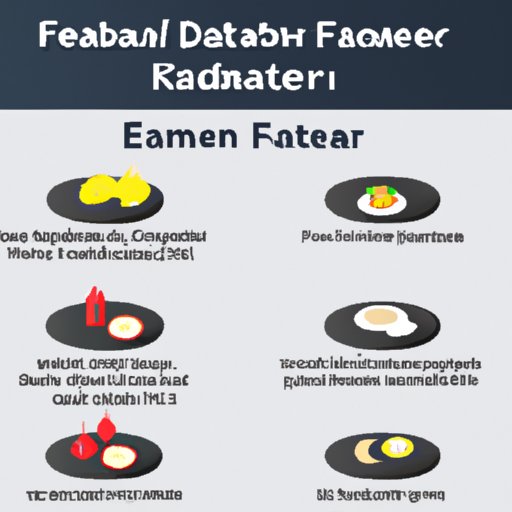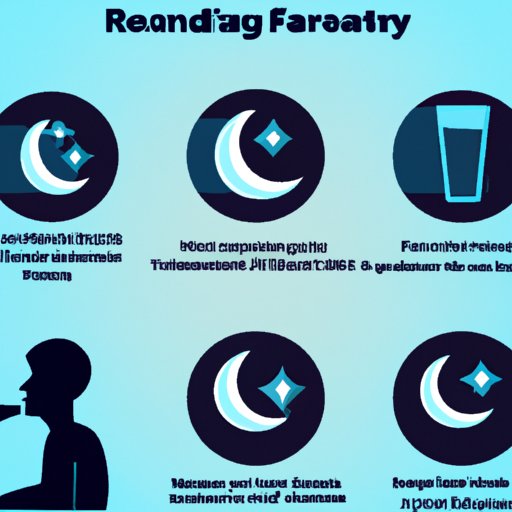Introduction
Ramadan fasting is an important part of the Islamic faith. It is observed by Muslims all over the world and involves abstaining from food, drink, and other activities for a set period of time. The purpose of Ramadan fasting is to bring Muslims closer to God and to practice self-control and discipline. There are many benefits to Ramadan fasting, both physical and spiritual, that make it an invaluable part of the Islamic faith.
Explaining the Basics of Ramadan Fasting
What is Ramadan? Ramadan is the ninth month of the Islamic calendar and is observed as a time of fasting, prayer, and reflection. During this month, Muslims abstain from food, drink, and other activities from sunrise to sunset. They also spend extra time in prayer and reflection, focusing on their relationship with God. At the end of the month, Muslims celebrate Eid al-Fitr, a joyous holiday that marks the end of Ramadan fasting.
How to Prepare for Ramadan Fasting: Before beginning Ramadan fasting, Muslims should begin to prepare their bodies and minds for the month ahead. This includes adjusting their eating and sleeping habits, as well as taking time to reflect on their spiritual journey. Additionally, they should stock up on healthy foods, such as fruits and vegetables, and be sure to stay hydrated throughout the day.
Rules for Ramadan Fasting: During Ramadan, Muslims must refrain from eating or drinking anything from dawn to dusk each day. Additionally, they should avoid engaging in any sexual activity or consuming any intoxicants. They should also strive to maintain good behavior and practice acts of charity and kindness.

Discussing the Benefits of Ramadan Fasting
Health Benefits: Ramadan fasting can have positive effects on physical health. It has been linked to lower cholesterol levels, improved blood sugar control, and better heart health. Additionally, fasting can help reduce inflammation and improve the body’s ability to fight off infections. Finally, it can help promote weight loss and increase energy levels.
Mental & Emotional Benefits: Ramadan fasting can also have positive effects on mental and emotional health. Studies have shown that fasting can reduce stress and anxiety, improve mood, and enhance focus and concentration. Additionally, fasting can help promote self-discipline, self-control, and self-awareness.
Spiritual Benefits: Perhaps the most significant benefit of Ramadan fasting is its spiritual effects. By abstaining from worldly pleasures and focusing on prayer and reflection, Muslims can draw closer to God and develop a deeper connection with their faith. Additionally, fasting can help cultivate patience and humility, and remind Muslims of the importance of charity and gratitude.

Describing the Different Types of Fasts Observed During Ramadan
Sunnah Fasts: Sunnah Fasts are voluntary fasts that are not obligatory but highly encouraged. These fasts are typically observed on Mondays and Thursdays, and involve abstaining from food, drink, and other activities from dawn to sunset. Sunnah Fasts are a great way to earn extra reward from God.
Nafl Fasts: Nafl Fasts are also voluntary fasts, but unlike Sunnah Fasts, they are not limited to certain days of the week. Instead, Muslims can choose to observe them whenever they wish. These fasts are typically shorter than Sunnah Fasts, lasting only until noon or mid-afternoon.

Examining How Ramadan Fasting Affects Health
Nutritional Benefits: Ramadan fasting can provide many nutritional benefits. It can help individuals become more mindful of their eating habits and make healthier food choices. Additionally, fasting can help reduce calorie intake and boost metabolism, which can lead to weight loss. Lastly, fasting can help regulate the body’s natural rhythms, such as hunger and sleep cycles.
Physical Activity Benefits: Ramadan fasting can also provide physical activity benefits. Fasting can help increase energy levels, which can make it easier to exercise and engage in physical activity. Additionally, fasting can help reduce fatigue and muscle soreness, allowing individuals to work out longer and harder.
Mental Health Benefits: Finally, Ramadan fasting can have positive effects on mental health. Fasting can help reduce stress and anxiety, while also improving focus and concentration. Additionally, fasting can help cultivate self-discipline and self-control, which can be beneficial in managing difficult emotions and situations.
Exploring the Cultural Significance of Ramadan Fasting
The Role of Community: Ramadan fasting is not just about individual spiritual growth, but also about strengthening community ties. During this month, Muslims come together to share meals, exchange gifts, and offer support and encouragement. These communal activities can help foster a sense of belonging and unity among Muslims.
The Importance of Charity: Another important aspect of Ramadan fasting is charity. Muslims are encouraged to donate to those in need and to show kindness and compassion towards others. This act of giving can help build strong relationships and create a sense of shared responsibility within the community.
Meaningful Celebrations: At the end of Ramadan, Muslims celebrate Eid al-Fitr, a joyous holiday that marks the end of the month-long fast. During this time, Muslims gather with family and friends to enjoy festive meals, exchange gifts, and give thanks to God for His blessings.
Highlighting the Spiritual Benefits of Ramadan Fasting
Closer Connection to God: One of the main goals of Ramadan fasting is to draw closer to God. Through prayer and reflection, Muslims can develop a stronger connection with their faith and gain a greater understanding of God’s will. Additionally, fasting can help cultivate humility and patience, which can be beneficial in developing a deeper relationship with God.
Increased Self-Control: Another benefit of Ramadan fasting is increased self-control. Abstaining from worldly pleasures can help individuals become more aware of their impulses and learn to better manage their emotions. Additionally, fasting can help individuals become more disciplined and focused, which can be beneficial in many aspects of life.
Renewed Focus on Prayer: Finally, fasting can help renew one’s focus on prayer. By setting aside time each day to pray and meditate, Muslims can deepen their connection with God and find peace and comfort in their faith. Additionally, prayer can help bring clarity and guidance when making difficult decisions.
Conclusion
Ramadan fasting is an important part of the Islamic faith. It offers many physical and spiritual benefits, including improved health, enhanced mental and emotional wellbeing, and a deeper connection to God. Additionally, Ramadan fasting has important cultural and social implications, as it serves to strengthen community bonds and promote charitable giving. For these reasons, Ramadan fasting is an invaluable part of the Islamic faith and should be embraced by all.
(Note: Is this article not meeting your expectations? Do you have knowledge or insights to share? Unlock new opportunities and expand your reach by joining our authors team. Click Registration to join us and share your expertise with our readers.)
